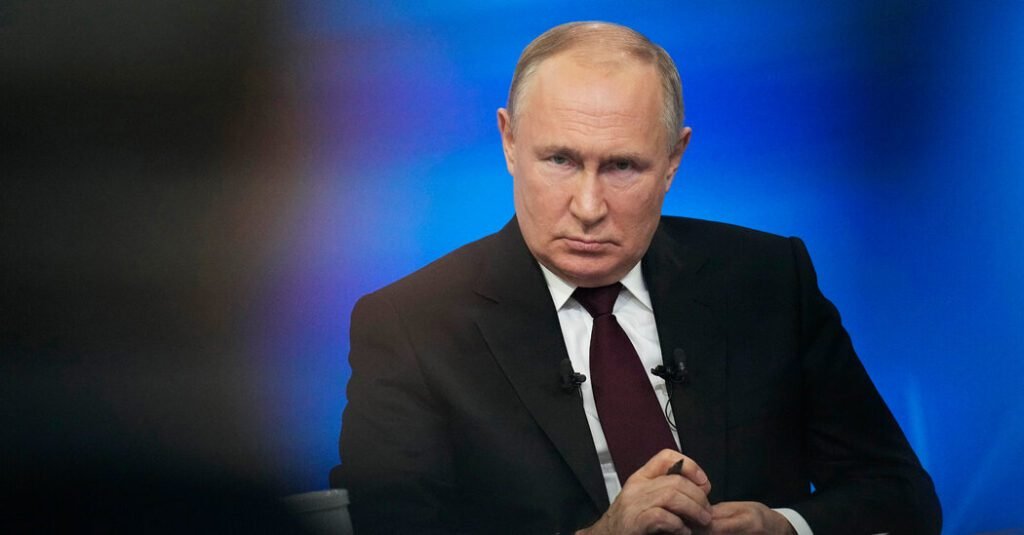President Vladimir V. Putin called on the United States to “make a deal” to cede Ukrainian territory to Russia to end the war, speaking for two hours with a former Fox News host in an interview that aired Thursday, the most direct appeal of the Kremlin. to the American public since its invasion began two years ago.
“Wouldn’t it be better to negotiate with Russia? Make a deal,” Mr. Putin told Tucker Carlson, the American conservative commentator, in the Russian leader’s first interview with an American magazine since 2021. “Start respecting our country and its interests and look for some solutions.”
Much of the interview was a familiar Kremlin history lesson on Russia’s historic claim to Eastern European lands dating back to the ninth century, which Mr. Putin made little effort to distill for American ears. Mr Putin also laid out his well-worn and false justifications for invading Ukraine, claiming Russia’s aim was to “stop this war” it claims the West is waging against Russia.
But Mr. Putin was more direct than usual about how he sees his invasion of Ukraine ending: not with a military victory, but through a deal with the West. At the end of the interview, Mr. Putin told Mr. Carlson that the time had come for talks to end the war because “those in power in the West have realized” that Russia will not be defeated on the battlefield.
“If so, if the awareness has started, they need to think about what to do next. We are ready for this dialogue,” Mr Putin said.
Asked by Mr Carlson whether NATO could accept Russian control of parts of Ukraine, Mr Putin said: “Let them think about how to do it with dignity. There are options if there is a will.”
The original Russian version of Mr. Putin’s comments was not immediately released, leaving viewers to rely on the dubbed translation on Mr. Carlson’s show.
The interview, conducted on Tuesday, was Mr. Putin’s first with a Western media outlet since the start of the war in Ukraine and his first with an American one since 2021. While Mr. Putin has regularly given interviews to mainstream U.S. media on his first two decades in office, his spokesman said the Kremlin chose Mr. Carlson this time because those traditional outlets take “an exclusively one-sided position” on Russia.
Given the opportunity by Mr. Carlson to extend his efforts to portray Russia as a defender of “traditional values” against what he often portrays as a degenerate and declining West, the Russian president was uncharacteristically reserved. “Western society is more realistic,” he said. “Russians think more about the eternal, about moral values.”
He added that “there is nothing wrong” with the Western path, noting that it had led to “good success in production, even in science.” It echoed Mr Putin’s frequent claim over the past two years that his conflict is not with the West as a whole, but with a hegemonic ruling elite.
Mr. Putin’s appearance underscored his tactical confidence as his opponents face a vulnerable moment: Ukraine is struggling on the battlefield, further military aid has stalled in the U.S. Congress and Kremlin-friendly politicians are rising in both sides of the Atlantic. Chief among these politicians is former President Donald J. Trump, the Republican presidential candidate whom Mr. Carlson often praises.
That confluence of circumstances means the interview with Mr. Carlson comes as Mr. Putin feels his “finest hour,” said Tatiana Stanovaya, a senior fellow at the Carnegie Russia Eurasia Center.
Mr. Putin’s ultimate goal, he said, is to secure a peace deal in Ukraine that would consolidate Russia’s control over the territories it has already seized and install a friendly government in Kiev, Ukraine’s capital. But to achieve this, Mr Putin appears to believe he needs the United States to pressure Ukraine to negotiate an end to the war, rather than continue to resist Russian aggression.
“He believes he now has a window of opportunity,” he said.

